What To Do This Earth Month at NC State & Beyond
Discover how to make the world a more sustainable place this Earth Month on NC State University’s campus and beyond. Whether you’re a community member, a student or a professional, we’ve found events for everyone to learn something new.
WHAT TO LEARN
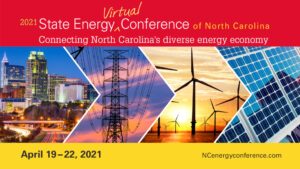 The NC Clean Energy Technology Center’s (NCCETC) 2021 State Energy Conference (SEC) of North Carolina is being held virtually this year, April 19-22. The SEC has six different tracks to choose from with 30+ sessions available as on-demand or live options. The tracks include: Commercial & Industrial Buildings, Residential Homes, Governmental & Institutional Buildings,Renewable Energy, Utilities & Infrastructure and GridEdge.
The NC Clean Energy Technology Center’s (NCCETC) 2021 State Energy Conference (SEC) of North Carolina is being held virtually this year, April 19-22. The SEC has six different tracks to choose from with 30+ sessions available as on-demand or live options. The tracks include: Commercial & Industrial Buildings, Residential Homes, Governmental & Institutional Buildings,Renewable Energy, Utilities & Infrastructure and GridEdge.
The 2021 SEC agenda includes both on-demand and live sessions with topics covering clean technology and energy policy, pathways to decarbonization, cybersecurity, energy storage and other emerging clean energy technologies. Attendees may also receive professional continuing education credits for engineers, architects, energy managers, energy auditors, planners, and other self-reporting professionals.
WHAT TO DO
Both on NC State’s campus and beyond, there’s virtual and in-person ways to celebrate Earth Month.
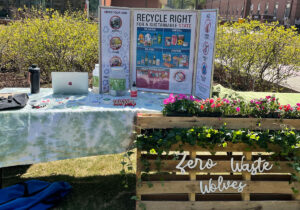 Sydney Crisanti is a junior at NC State studying environmental engineering and the president of the Zero Waste Wolves (ZWW). ZWW are the pioneers of paper towel composting on NC State’s campus and are committed to reducing waste on campus and in the community.
Sydney Crisanti is a junior at NC State studying environmental engineering and the president of the Zero Waste Wolves (ZWW). ZWW are the pioneers of paper towel composting on NC State’s campus and are committed to reducing waste on campus and in the community.
“We were just awarded a sustainability grant to expand the paper towel composting program,” Sydney Crisanti, President of ZWW said. “We want to make composting more accessible and expand it across all of campus.” The ZWW are also hosting a presentation on eco-travel for those who are interested in reducing their impact on the environment when traveling.
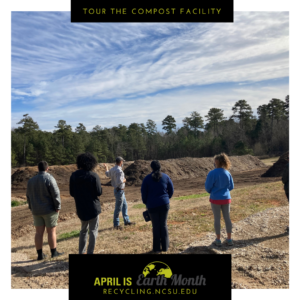 You can sign up to tour NC State’s Compost Facility and Research Cooperative with WRR to learn more about the closed-loop organic waste management system on NC State’s campus. The compost produced at the facility is used in campus landscapes and at the Agroecology Education Farm. The facility has processed 937 tons of material so far in fiscal year 2020-2021.
You can sign up to tour NC State’s Compost Facility and Research Cooperative with WRR to learn more about the closed-loop organic waste management system on NC State’s campus. The compost produced at the facility is used in campus landscapes and at the Agroecology Education Farm. The facility has processed 937 tons of material so far in fiscal year 2020-2021.
Milannee St. Hill, outreach coordinator at NC State’s Office of Waste Reduction and Recycling (WRR), said, “Everyone has a role in making our community and planet healthier and safer. There’s so many ways to get involved.”
The Southern Alliance for Clean Energy and Natural Resources Defense Council is hosting a “Virtual Earth Week Electric Vehicle Ride & Drive” with race car driver and environmental activist Leilani Münter. This Earth Week webinar will begin with a virtual ride with Münter herself followed by a live question and answer session.
WHAT’S HAPPENING
For the first week of Earth Month, the Eco+Pack is joining together sustainability-focused organizations across NC State to unite their efforts to plan events, share resources and learn from one another. Enacted by NC State Student Government’s Department of Sustainability, the coalition includes the Climate Reality Project Campus Corps, the Beekeepers Club, the Environmental Student Association, the National Parks Club and the Zero Waste Wolves.
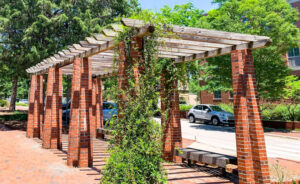 The NC State Stewards are excited to support the campus’s transition to clean energy this month as they break ground on their SolarSpace project. Starting on April 12th, a terrace in Gardner Arboretum will be undergoing a renovation to provide clean energy to students and members of the community. Four refurbished solar panels donated by SolarPack will provide 800 watts for charging cell phones, laptops and other electronics.
The NC State Stewards are excited to support the campus’s transition to clean energy this month as they break ground on their SolarSpace project. Starting on April 12th, a terrace in Gardner Arboretum will be undergoing a renovation to provide clean energy to students and members of the community. Four refurbished solar panels donated by SolarPack will provide 800 watts for charging cell phones, laptops and other electronics.
WHAT TO WATCH
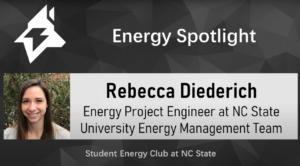 Watch the Student Energy Club’s Energy Spotlight for the month featuring Rebecca Diederich, an energy project engineer for the NC State Energy Management team. Diederich manages the NC State University Utility Reduction Program which focuses on campus energy conservation projects, including the Commissioning Team which identifies and repairs inefficiencies in campus buildings as well as optimizing building performance to ensure an efficient and sustainable operation.
Watch the Student Energy Club’s Energy Spotlight for the month featuring Rebecca Diederich, an energy project engineer for the NC State Energy Management team. Diederich manages the NC State University Utility Reduction Program which focuses on campus energy conservation projects, including the Commissioning Team which identifies and repairs inefficiencies in campus buildings as well as optimizing building performance to ensure an efficient and sustainable operation.
“We’re working with [the NCCETC] because we’re trying to kick off a project for renewables on Centennial Campus,” Diederich said in the virtual interview. The project includes a feasibility study of a 283 kilowatts solar installation on Fitts-Woolard Hall and a possible energy storage system with a scope of 500 kilowatts.
The NCCETC’s fourth annual “Keep Our Air Clean” Student Art Contest is currently accepting submissions from students in kindergarten through high school until April 18. Students are invited to submit their artwork showcasing actions people can take to reduce air pollution. Public voting will take place on our Facebook Page during Earth Week.
To stay up to date on clean energy this Earth Month, follow the NCCETC on social media.